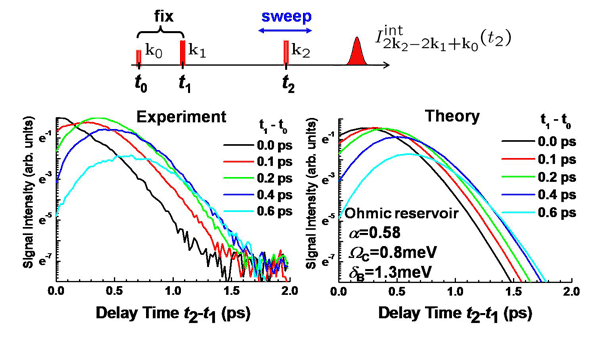Light-exciton interaction
Researcher: M. Kujiraoka, S. Mitsutake, and M. Sasaki
Decoherence suppression of excitons using successive femtosecond optical pulses (Collaboration with F. Minami at Tokyo Institute of Technology)
Decoherence is induced by the interaction between the electron system and the thermal reservoir. Since it is difficult to control the interaction with the reservoir at will, the control of decoherence has been considered impossible and decoherence time has been considered intrinsic in materials. In addition, decoherence is the irreversible process and we cannot to return the system back to its original condition. However, it was revealed that it is possible to return the system back to its original condition within limited time. One practical method of this “time reversing” is to apply a sequence of state-reversing pulses (π pulses) on the system with their intervals being less than the noise correlation time. This is now referred to as “bang-bang” BB control. Due to this time reversibility, the decoherence time can be extended up to the energy relaxation time by irradiating a sequence of π pulses.
We succeeded in extending the decoherence time of excitons in a semiconductor GaSe by using successive three femtosecond pulses, i.e., the six-wave mixing configuration. This will be a powerful method to realize the quantum information devices using semiconductors with short decoherence time. The experiment has been done in collaboration with Prof. F. Minami's group of Tokyo Institute of Technology.

T. Kishimoto, A. Hasegawa, Y. Mitsumori, J. Ishi-Hayase, M. Sasaki, and F. Minami
Physical Review B 74, 073202 (2006)

